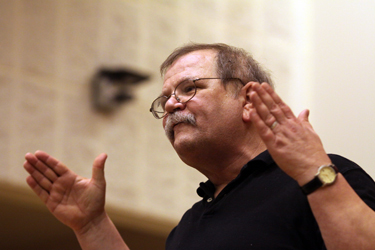 In 1978 Samuel Green was living in the Seattle area and struggling to find his writing voice when poet Carolyn Forche asked him to consider this: “If you want to write a certain kind of poem, maybe you ought to live the sort of life from which such poems might come.”
In 1978 Samuel Green was living in the Seattle area and struggling to find his writing voice when poet Carolyn Forche asked him to consider this: “If you want to write a certain kind of poem, maybe you ought to live the sort of life from which such poems might come.”
“It was an amazingly astute statement that would not go away,” Green told an audience gathered for his public reading in the College’s Korb Classroom on Thursday. “It forced me to ask myself, What kinds of poems do I really want to write, and what sort life would bring them into being.”
The answers Green found led him and his wife, Sally, to Puget Sound’s Waldron Island and the small community where he found not only his poetic voice, but a life among others and, as he writes, stories that “gather as tiny birds add themselves one and one to the flock, their small throats gathering the One Great Song that is more than themselves alone.”
The poet laureate of Washington state from 2008 to 2010, Green “sang” that song to the Wabash community in stories and in his poems Thursday night.
“In a small community, what happens to people matters to you,” Green said after being introduced by longtime friend and fellow poet Wabash Professor of English Marc Hudson. He read a poem written for the memorial service of a biologist who had lived on the island but died in a helicopter accident during the search for a lost hiker:
Now, in the shortening days when light unbraids
too early, let us astonish each other
with love, as though, through us, we channel her desire.
Let us summon her here that she be present…
The co-owner of the island’s Brooding Heron Press, Green also noted that “in a small community you learn to live with people you don’t like, you learn that not liking someone is not an excuse for not being with them.
“I had to live with people as they are, not the way I wanted them to be, which is a great gift for me: I had to change myself because I couldn’t change other people.”
Green described digging a grave with fellow islanders for a 90-year-old man who had died suddenly after a fall; on Waldron, the responsibility for such work often falls to one’s neighbors. He was “under our care,” Green noted before reading his poem, “Grave Digging”:
We could be working in gardens, we four
men with shovels, grubhoes, picks. We bend
our backs & and through the soil laid down
in an old man’s life with the first half slice
of a shovel blade. We work with an ease
that surprises, the banter of neighbors who come
at odd moments together…
He talked about his father, now in his 80s, who has suffered back pain since the day he was beaten by his father at age 17 while working on fishing boat in Alaska. Green read a poem mourning that day but honoring his father’s own legacy. “As my grandfather beat my father, my grandfather’s father likely beat his son, too,” Green said. “Yet my father never hit me, and I never hit my son, and my son is the most gentle, wonderful father—he could never hurt his little girl. So my father is a hero to me for breaking that chain.”
I bring my father back because I want
to tell that boy that he will not beat
his own two sons, & they will not
beat theirs, to tell him though he’ll mourn
the fact that he cannot mourn his father’s death,
I know I’ll weep for his. But the boy can’t hear me…
Green read from a series of short poems he wrote on postcards, one per year, during 2001. The poem written September 9 of that year seems prescient:
A nuthatch slams into the bay
window. The ledge catches her,
keeps her from the cat’s mouth,
but she stays there, stunned, caught
by the betrayal of air turned suddenly
solid. How could she ever move
past this moment without the grace
of necessity? How could any of us?
He recalled the hospitality of the people of New York City when he traveled there for a reading not long after the 9/11 attacks. A Polish man there not only gave him directions to the place he needed to go, but missed his own stop to make sure he got there safely. When Green offered his gratitude as they were saying goodbye, the man said, “No one should be lost when someone else knows the way.”
The audience was treated to the first public reading of a new poem, then Green answered questions. A woman noted that the poem seemed to speak “in humble absolutes.”
“I love the phrase, though I’m not sure about the absolute,” Green said. “But if you pay attention to the world, you can’t help but be humble.”